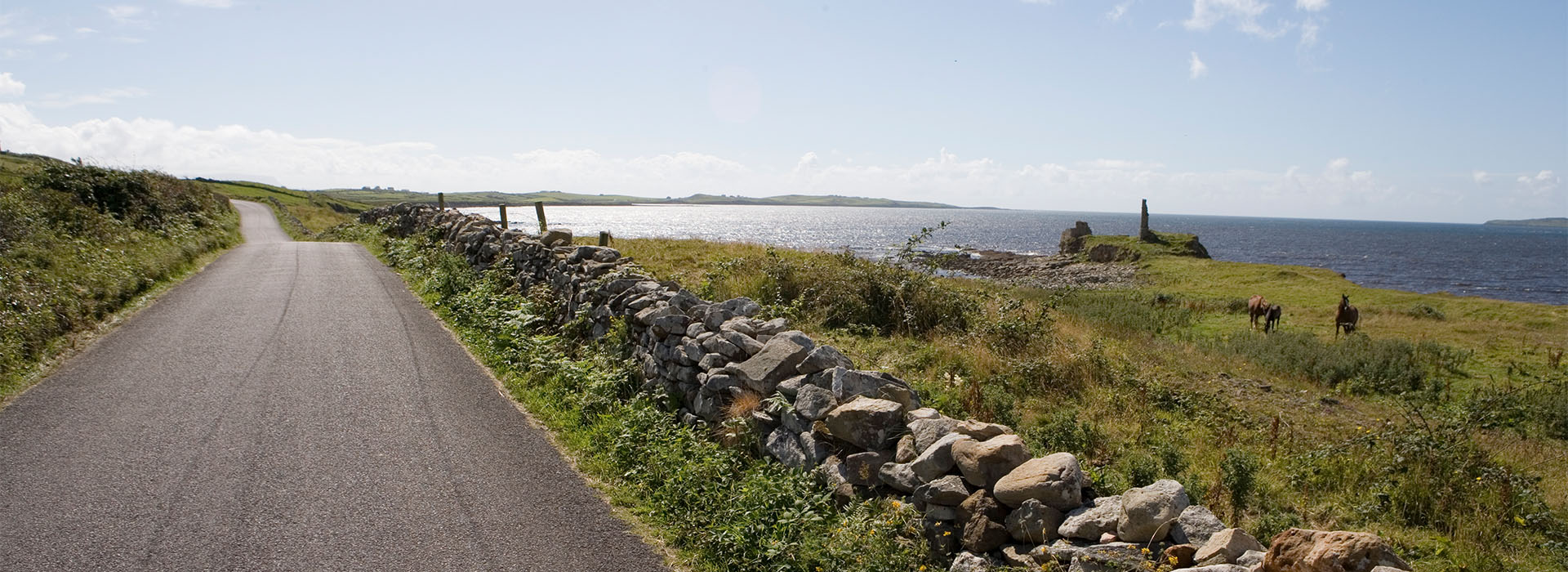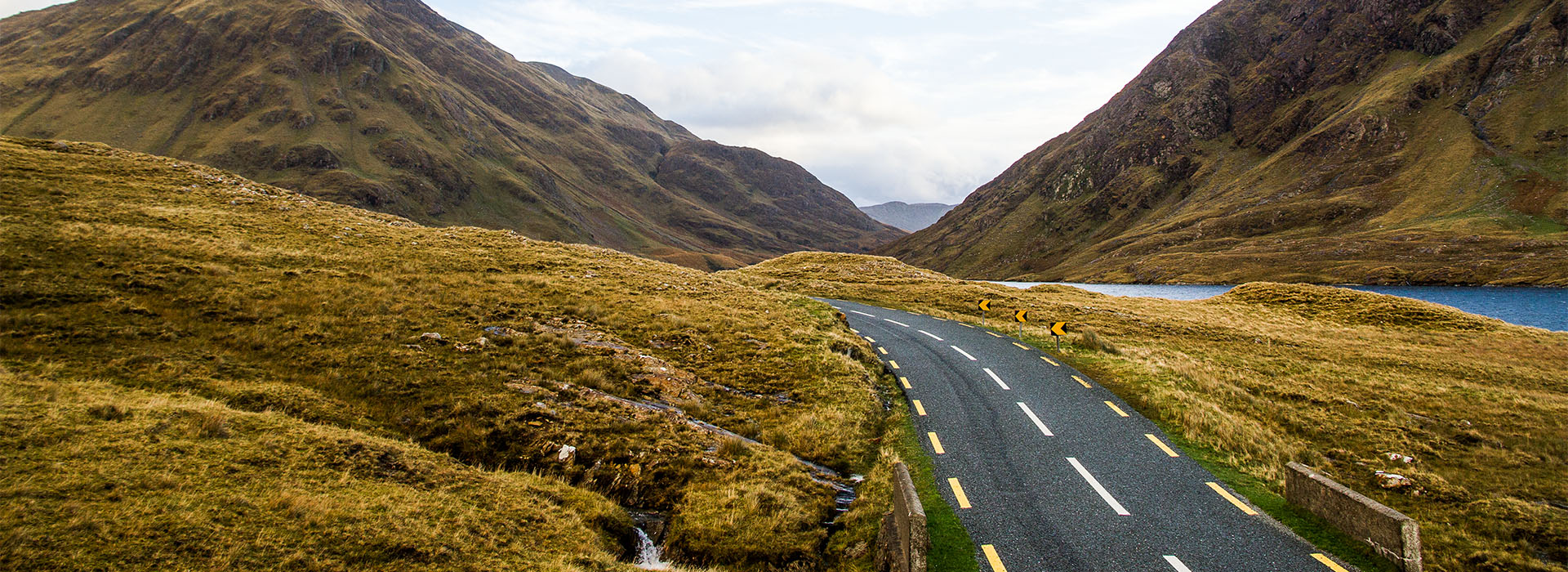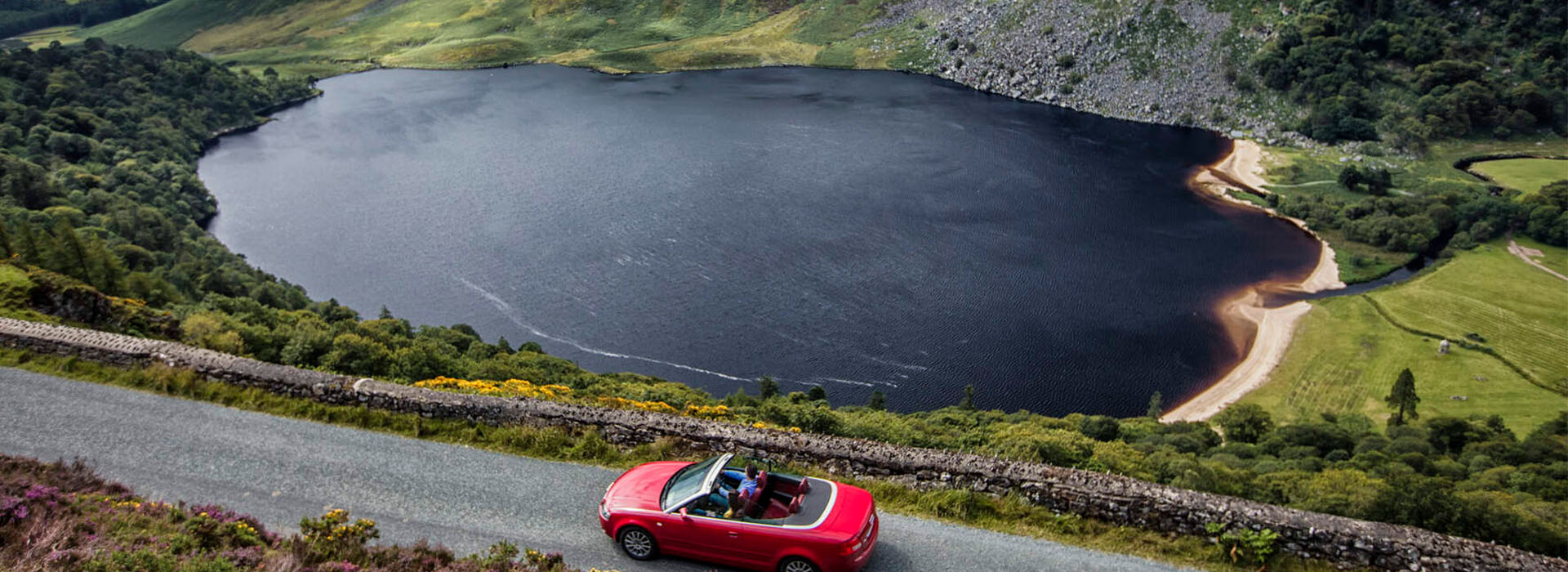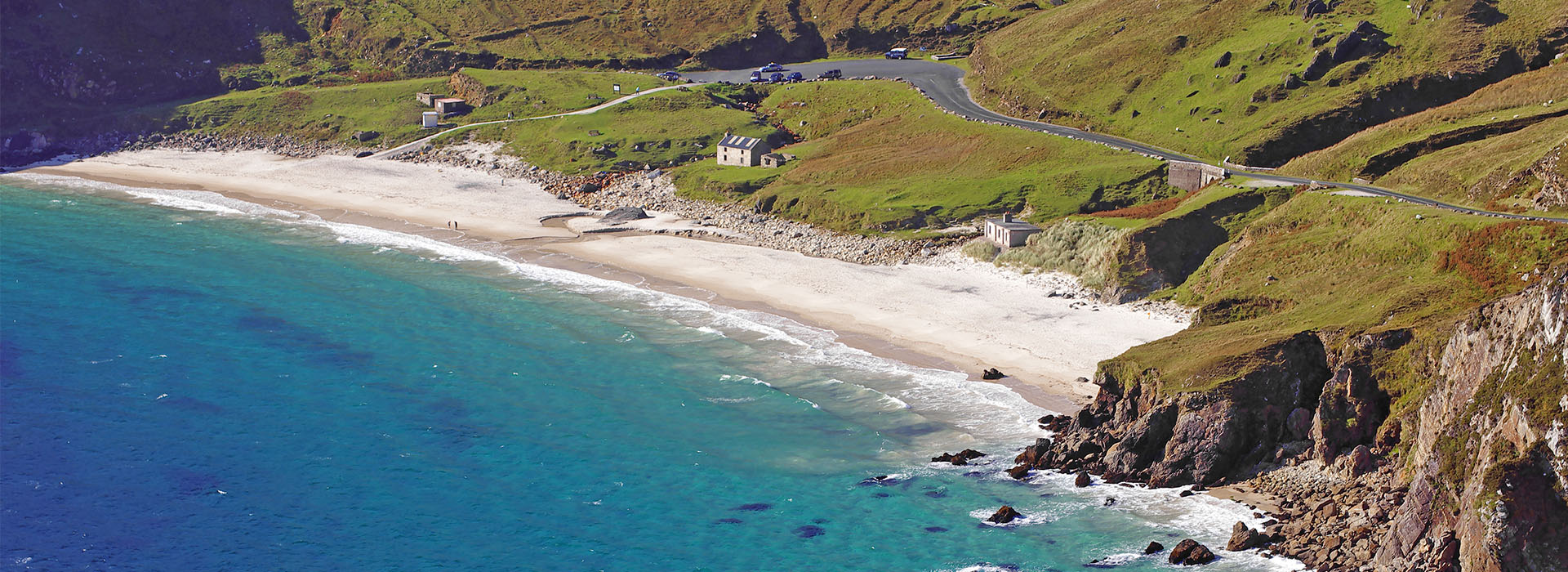Top-14 tips on Renting Cars in Ireland
Here are our Top-14 tips to make sure your car rental experience in Ireland is a great one:

Errigal, Donegal
1: Book Well in Advance
In order to guarantee best value and to ensure availability of the car you want, do not leave your car rental booking to the last minute! And if you are really keen on maximising value, avoid the peak season months of July and August.

Achill Island, Co Mayo
2: Read your rental agreement
Yes, a car rental agreement is long and detailed, but you and your passengers need to be properly protected, the car you are renting is a valuable piece of equipment, and many years of experience have demonstrated that the details included are essential, so that everyone can be clear where their rights and responsibilities lie.
In particular, look out for the various insurances, waivers and other options appropriate to your needs and understand the costs involved. Check for any exclusions in the cover offered. And be aware that in many cases, a security deposit is taken, at the point of car pick-up, via a refundable pre-authorised charge to your credit card. This is to cover gaps in your cover for any damage the car might sustain (for more details see Make Sure You’re Covered below).
Value added tax (VAT) will be charged and you should take note of any airport, fuel, refuelling, cancellation or other charges.

Bring your credit card
3: Bring your credit card
You must present a credit card in your own name to collect a rental car. While you can pay for your rental using a debit card, you must present a credit card in your own name in order to collect the car. This is in order to allow for the ring-fencing of any damage excess deposits/deductibles, which cannot be done with a debit card.
Please make sure the credit card you intend using is accepted by the car rental company.
And make sure there is a high enough limit on the credit card to accept pre-authorised amounts to cover damage excesses.

Glenmacnass, Co Wicklow
4: Video the Car
Give yourself plenty of time to video or photograph the car inside and out, slowly and in good light, pausing on any damage, before you start your journey. Check the spare wheel and the tools. If you spot any damage or missing equipment that hasn’t been highlighted at the desk, photograph it and notify your car rental company.
And give yourself plenty of time to do the same when you have finished your trip and are returning the car.

Call if you are going to be late
5: Let your car rental company know if you’re late
Car rental companies offer the best price possible by operating in an extremely efficient manner. Latecomers, if they do not notify the car rental company, can have a significant impact on operations and in some cases, they can even lose the car that was allocated to them or may incur additional charges. So keep your car rental company in the loop! If arriving to an airport location, please ensure you give your flight number when booking, as without this, the car rental company will not know you are delayed while in the air.

The Burren, Co Clare
6: Make Sure You’re Covered
It is particularly difficult to cover damage to rental cars in Ireland due to a long history of a high claim levels and high insurance costs in this country, but the car you are renting is a valuable piece of equipment, so car rental companies have to be very careful here in ensuring that you can get cover for all risks. It is important to be very clear on the type of cover you are buying.
What Is Automatically Included
Third party insurance is compulsory in Ireland and will be included in the rental rate.
This however only covers you for other people’s injury and damage to their vehicle/property. It does not cover you for damage to your rental car, theft or personal injury to yourself.
Basic Cover You Should Purchase
Without some form of additional cover, you will typically be liable for all damage to your rental car, on the rare occasion where damage occurs. In order to provide reassurance to customers, car rental companies offer collision damage waiver (CDW) which limits your financial liability for damage to the rented vehicle. CDW is often included in standard rental rates. Check your booking to determine whether this is the case.
You should note that CDW cover may have exclusions (e.g. windscreen, tyres).
CDW cover is normally subject to an excess/deductible, payable by you. To avoid having to pay this excess/deductible, check out the next section, “Cover You Should Seriously Consider Purchasing”.
Some visitors arrange CDW cover using a credit card facility (e.g. US MasterCard Gold or Platinum). If you intend doing this, you must first confirm with the car rental company that your particular card will be accepted for this use. And then you must provide written confirmation of the CDW cover for your trip, from the credit card company, verifying that Ireland is covered. This written confirmation must be personalised to the driver and their card – the generic ‘benefits pack’ will not be accepted. You will still be obliged to provide a deposit to cover damages, and you may be obliged to take out Supplementary Liability Waiver (SLW) cover – these measures are to protect both you and the car rental company from gaps in the credit card company’s insurance. Please note that if any damage occurs, you will be charged by the car rental company, and you must then claim these costs back via your credit card company insurance.
Many car rental companies do not accept CDW cover purchased from third parties other than approved North American credit cards used by North American customers. This approach is rooted in their experience of such insurance policies being presented as ‘full cover’ when in fact they do not cover all eventualities and the rental company is left pursuing the customer for damages that the third-party insurer refuses to pay. In this circumstance, car rental companies will often oblige a customer to take out their CDW cover regardless of what other cover the customer has. This approach is there to protect both the customer and the car rental company from onerous liabilities.
It is also worth noting that operationally, the staff at a car rental counter are not qualified to assess third-party policies to determine whether they are valid in Ireland and cover all eventualities; and so the company policy in place on this issue must be strictly adhered to.
Some car rental companies will also offer cover for theft which limits your financial liability for loss or theft of the rented vehicle; and personal accident insurance, which covers the driver for personal injuries.
In summary, CDW is an important piece of cover designed to protect you from much of the cost incurred if your rental car is damaged, but it is subject to an excess/deductible, payable by you in the event of damage, which requires a security deposit. If you want to avoid this, check out the next section, Cover You Should Seriously Consider Purchasing.
Cover You Should Seriously Consider Purchasing
CDW is subject to an excess or deductible (generally between €1,300 – €3,000) payable by you, which requires a security deposit. Car rental companies offer additional cover against this excess/deductible, called an excess waiver*. A security deposit does not apply (or is greatly reduced) if you purchase an excess waiver directly from a car rental company. And if you have purchased an excess waiver directly from the car rental company, and you damage the vehicle, you will only pay the amount of your reduced excess or deductible – usually zero.
Customers can also purchase what is known as a ‘Damage Excess Refund’ (DER) policy from a third party. Third party DER policies do not pay the car rental company directly for damage. If damage occurs and the car rental company has charged you for that damage up to the excess/deductible amount, then you claim back the excess/deductible you paid from the DER.
Where you take out a third-party DER, you will still have to leave a deposit to cover the excess/deductible with the car rental company, which you then claim back from the DER in the event of the car being damaged. In cases where you have purchased a DER policy but cannot cover the excess/deductible on your credit card, or are using a debit card, you may be required to take out the car rental company’s excess waiver cover.
In summary, if you would rather not have to have an excess/deductible deposit preauthorised on your credit card, then you should purchase an excess waiver directly from the car rental company.
*NOTE: ‘Excess waiver’ can also be called excess waiver cover, super damage waiver, super collision damage waiver, damage excess waiver, or excess protection, depending on the car rental company you use.
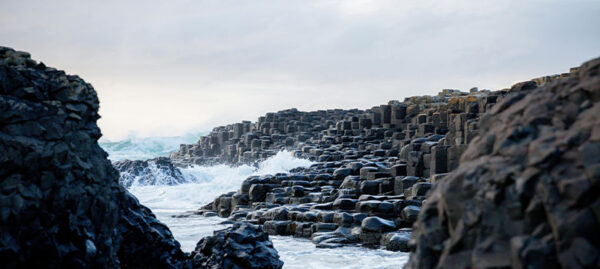
Giants Causeway, Antrim
7: Tell them if you’re driving into Northern Ireland
From 2025, many overseas tourists will need an Electronic Travel Authorisation to travel to Northern Ireland. See the full details here: https://www.tourismireland.com/international/en-us/eta
Most car rental companies will allow travel to Northern Ireland as long as you inform them when you collect the car and pay a cross border fee. To be certain, please check the website of the car rental company you intend to use. And do not leave the island of Ireland under any circumstances!

Refuel the car
Refuel the car
If your contract includes a full fuel tank or battery, to be returned full, then make sure to refuel before returning. This is cheaper for you and easier to manage for the car rental companies. Please take the time to find the closest fuel station to your return location to ensure no extra charges.

Connemara, Galway
9: Return the car clean inside
Give the car a general clean before you return it. If the car is deemed to be returned with an unacceptable level of cleanliness by the rental company, a cleaning fee may be charged to your deposit.
In particular, do not smoke in the car. The smell of smoke is easy to detect and very difficult to remove and will incur a charge.
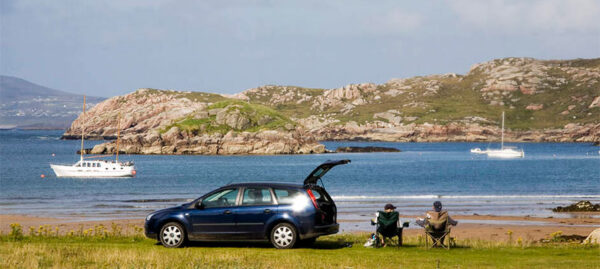
Cruit Island, Donegal
10: Tell them about any damage
The car you are renting is a valuable piece of equipment and the value of the car must be preserved. Car rental companies insist on this principle because the value of the car when they sell it, typically at the end of the season, is pivotal to their keeping their prices low and making a return on the car. Damage will reduce the amount they can sell the car for so the damage either has to be made good to the original standard of the car, or the loss in value has to be covered.
The rental company expects you to take good care of their vehicle. You will be liable for all damage to the car including damage by third parties or damage arising from misuse, off road driving or other acts of negligence. These charges will include loss of income arising from a vehicle not being available for renting. This also applies to the theft of or from a vehicle.
All returned vehicles are thoroughly inspected, either immediately on return or later, when they are sent for cleaning and refuelling. Be fully upfront about any damage sustained by your rental car so it can be noted and agreed.
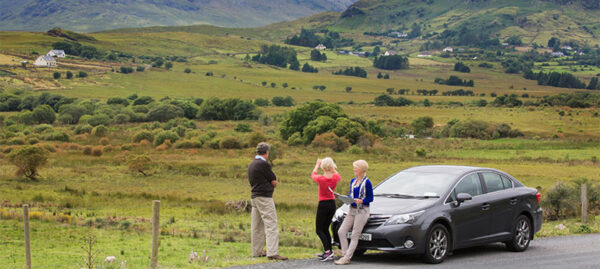
Connemara, Galway
11: Have the right documentation
Requirements regarding the documentation required vary from company to company and from time to time, so it is essential that you check directly with the rental company you are planning to use to verify what documentation they require.
You will generally need to have held a current, valid, full, clean driving licence for at least 2 years.Some companies will require just a national driver’s licence in Roman script, others will also require an international driving permit (IDP).
If you are required to carry an IDP, make sure you also carry your licence along with your IDP – the permit will not be valid without it.The IDP should not be confused with an international driver’s licence – a document that can be bought online but is not an official certificate and is not accepted globally.
Passports are usually required for ID purposes.
Bring your credit card in order to allow for any necessary pre-authorisation of any damage excess/deductible deposits.
Some car rental companies may require additional documentation from drivers aged over 75 intending to rent a car.
Finally, photos or digital copies of documentation may not be accepted. Likewise, temporary copies of a licence which is being renewed or updated may not be accepted.

Connemara, Galway
12: Don’t forget the extra drivers
Unless you want to do all the driving yourself, make sure that you provide details of any additional drivers that will be driving when you’re booking. Additional drivers will be required to present themselves in person, along with their licence, before they can be added to the rental.
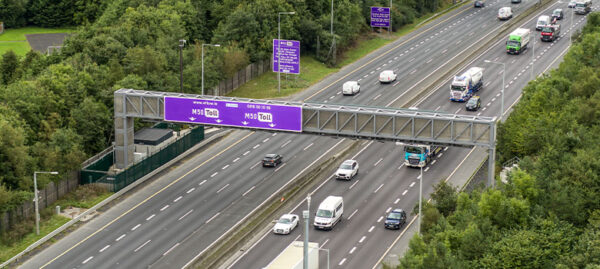
M50, Dublin
13: Ask about M50 tolls
Tolls are payable on some motorways at designated toll booths. These all take credit cards and most allow for tap payment using mobile phones.
However, there is a ‘No Barrier Tolling’ system on the Dublin M50 motorway between Junction 6 (N3 Blanchardstown) and Junction 7 (N4 Lucan). No payment facility is available at the M50 tolling point.
The policy for dealing with M50 tolls varies from company to company and from time to time, so check with your car rental company on how to pay for M50 tolls in order to avoid any penalty charges.
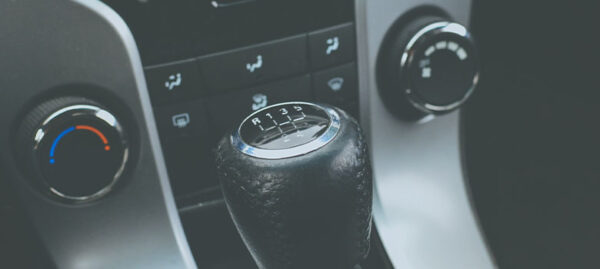
Hire an automatic
14: Avoid manual/stick-shift cars if you’re not used to them
Burnt out clutches are expensive to replace and avoidable by booking an automatic vehicle.
Top-14 tips on Renting Cars in Ireland
Here are our Top-14 tips to make sure your car rental experience in Ireland is a great one:

Errigal, Donegal
1: Book Well in Advance
In order to guarantee best value and to ensure availability of the car you want, do not leave your car rental booking to the last minute! And if you are really keen on maximising value, avoid the peak season months of July and August.

Achill Island, Co Mayo
2: Read your rental agreement
Yes, a car rental agreement is long and detailed, but you and your passengers need to be properly protected, the car you are renting is a valuable piece of equipment, and many years of experience have demonstrated that the details included are essential, so that everyone can be clear where their rights and responsibilities lie.
In particular, look out for the various insurances, waivers and other options appropriate to your needs and understand the costs involved. Check for any exclusions in the cover offered. And be aware that in many cases, a security deposit is taken, at the point of car pick-up, via a refundable pre-authorised charge to your credit card. This is to cover gaps in your cover for any damage the car might sustain (for more details see Make Sure You’re Covered below).
Value added tax (VAT) will be charged and you should take note of any airport, fuel, refuelling, cancellation or other charges.

Bring your credit card
3: Bring your credit card
You must present a credit card in your own name to collect a rental car. While you can pay for your rental using a debit card, you must present a credit card in your own name in order to collect the car. This is in order to allow for the ring-fencing of any damage excess deposits/deductibles, which cannot be done with a debit card.
Please make sure the credit card you intend using is accepted by the car rental company.
And make sure there is a high enough limit on the credit card to accept pre-authorised amounts to cover damage excesses.

Glenmacnass, Co Wicklow
4: Video the Car
Give yourself plenty of time to video or photograph the car inside and out, slowly and in good light, pausing on any damage, before you start your journey. Check the spare wheel and the tools. If you spot any damage or missing equipment that hasn’t been highlighted at the desk, photograph it and notify your car rental company.
And give yourself plenty of time to do the same when you have finished your trip and are returning the car.

Call if you are going to be late
5: Let your car rental company know if you’re late
Car rental companies offer the best price possible by operating in an extremely efficient manner. Latecomers, if they do not notify the car rental company, can have a significant impact on operations and in some cases, they can even lose the car that was allocated to them or may incur additional charges. So keep your car rental company in the loop! If arriving to an airport location, please ensure you give your flight number when booking, as without this, the car rental company will not know you are delayed while in the air.

The Burren, Co Clare
6: Make Sure You’re Covered
It is particularly difficult to cover damage to rental cars in Ireland due to a long history of a high claim levels and high insurance costs in this country, but the car you are renting is a valuable piece of equipment, so car rental companies have to be very careful here in ensuring that you can get cover for all risks. It is important to be very clear on the type of cover you are buying.
What Is Automatically Included
Third party insurance is compulsory in Ireland and will be included in the rental rate.
This however only covers you for other people’s injury and damage to their vehicle/property. It does not cover you for damage to your rental car, theft or personal injury to yourself.
Basic Cover You Should Purchase
Without some form of additional cover, you will typically be liable for all damage to your rental car, on the rare occasion where damage occurs. In order to provide reassurance, car rental companies offer collision damage waiver (CDW) which limits your financial liability for damage to the rented vehicle. You should note that CDW cover may have exclusions (e.g. windscreen, tyres).
CDW cover is normally subject to an excess/deductible, payable by you. For protection from this excess/deductible, check out the next section, Cover You Should Seriously Consider Purchasing. Some visitors arrange CDW cover using a credit card facility (e.g. US MasterCard Gold or Platinum). If you intend doing this, you must provide written confirmation of the CDW cover for your trip, from the credit card company, verifying that Ireland is covered. This written confirmation must be personalised to the driver and their card – the generic ‘benefits pack’ will not be accepted. You will still be obliged to provide a deposit to cover all damages and you may be obliged to take out Supplementary Liability Waiver (SLW) cover – these measures are to protect both you and the car rental company from gaps in the credit card company’s insurance. You can claim back any valid costs incurred from the credit card company insurance.
Some car rental companies will also offer cover for theft which limits your financial liability for loss or theft of the rented vehicle; and Personal Accident Insurance, which covers the driver for personal injuries.
In summary, CDW is an important piece of cover designed to protect you from much of the cost incurred if your rental car is damaged, but it is subject to an excess, payable by you in the event of damage, which requires a security deposit. If you want to avoid this, check out the next section, Cover you should seriously consider purchasing.
Cover You Should Seriously Consider Purchasing
CDW is subject to an excess or deductible (generally between €1300 – €3000) payable by you, which requires a security deposit. Car rental companies offer additional cover against that excess/deductible, called an excess waiver, often referred to as Super Damage Waiver cover (SDW). A security deposit does not apply (or is greatly reduced) if you purchase an excess waiver directly from a car rental company.
Customers can purchase what is known as a ‘Damage Excess Refund’ (DER) policy from a 3rd party, however, you must be aware that you will still have to leave a deposit to cover the excess with the car rental company. These 3rd party policies are only activated if you damage the vehicle and the car rental company charge you the excess amount, you must then claim back via the 3rd party DER for a refund.
So if you have purchased a damage excess waiver directly with the car rental company, and you damage the vehicle, you will only pay the amount of your reduced excess – usually zero.
If you have purchased a damage excess refund policy via a 3rd party, you will still need to leave a preauthorised excess amount with the car rental company and, in the event of damage, they will charge you the full repair cost, up to the maximum excess amount. This is then claimed back via the 3rd party company.
In summary, if you would rather not have to have an excess deposit preauthorised on your credit card, then you should purchase excess waiver cover directly from the car rental company.

Giants Causeway, Antrim
7: Tell them if you’re driving into Northern Ireland
Most car rental companies will allow travel to Northern Ireland as long as you inform them when you collect the car and pay a cross border fee. To be certain, please check the website of the car rental company you intend to use. And do not leave the island of Ireland under any circumstances!

Refuel the car
Refuel the car
If your contract includes a full fuel tank or battery, to be returned full, then make sure to refuel before returning. This is cheaper for you and easier to manage for the car rental companies. Please take the time to find the closest fuel station to your return location to ensure no extra charges.

Connemara, Galway
9: Return the car clean inside
Give the car a general clean before you return it. If the car is deemed to be returned with an unacceptable level of cleanliness by the rental company, a cleaning fee may be charged to your deposit.
In particular, do not smoke in the car. The smell of smoke is easy to detect and very difficult to remove and will incur a charge.

Cruit Island, Donegal
10: Tell them about any damage
The car you are renting is a valuable piece of equipment and the value of the car must be preserved. Car rental companies insist on this principle because the value of the car when they sell it, typically at the end of the season, is pivotal to their keeping their prices low and making a return on the car. Damage will reduce the amount they can sell the car for so the damage either has to be made good to the original standard of the car, or the loss in value has to be covered.
The rental company expects you to take good care of their vehicle. You will be liable for all damage to the car including damage by third parties or damage arising from misuse, off road driving or other acts of negligence. These charges will include loss of income arising from a vehicle not being available for renting. This also applies to the theft of or from a vehicle.
All returned vehicles are thoroughly inspected, either immediately on return or later, when they are sent for cleaning and refuelling. Be fully upfront about any damage sustained by your rental car so it can be noted and agreed.

Connemara, Galway
11: Have the right documentation
Requirements regarding the documentation required vary from company to company and from time to time, so it is essential that you check directly with the rental company you are planning to use to verify what documentation they require.
You will generally need to have held a current, valid, full, clean driving licence for at least 2 years.Some companies will require just a national driver’s licence in Roman script, others will also require an international driving permit (IDP).
If you are required to carry an IDP, make sure you also carry your licence along with your IDP – the permit will not be valid without it.The IDP should not be confused with an international driver’s licence – a document that can be bought online but is not an official certificate and is not accepted globally.
Passports are usually required for ID purposes.
Bring your credit card in order to allow for any necessary pre-authorisation of any damage excess/deductible deposits.
Some car rental companies may require additional documentation from drivers aged over 75 intending to rent a car.
Finally, photos or digital copies of documentation may not be accepted. Likewise, temporary copies of a licence which is being renewed or updated may not be accepted.

Connemara, Galway
12: Don’t forget the extra drivers
Unless you want to do all the driving yourself, make sure that you provide details of any additional drivers that will be driving when you’re booking. Additional drivers will be required to present themselves in person, along with their licence, before they can be added to the rental.

M50, Dublin
13: Ask about M50 tolls
Tolls are payable on some motorways at designated toll booths. These all take credit cards and most allow for tap payment using mobile phones.
However, there is a ‘No Barrier Tolling’ system on the Dublin M50 motorway between Junction 6 (N3 Blanchardstown) and Junction 7 (N4 Lucan). No payment facility is available at the M50 tolling point.
The policy for dealing with M50 tolls varies from company to company and from time to time, so check with your car rental company on how to pay for M50 tolls in order to avoid any penalty charges.

Hire an automatic
14: Avoid manual/stick-shift cars if you’re not used to them
Burnt out clutches are expensive to replace and avoidable by booking an automatic vehicle.

